Ditapis dengan
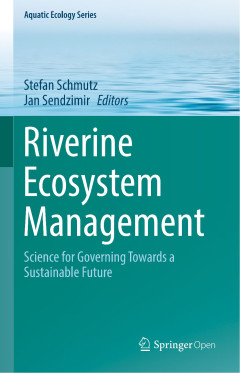
Riverine ecosystem management :science for governing towards a sustainable fu…
This open access book surveys the frontier of scientific river research and provides examples to guide management towards a sustainable future of riverine ecosystems. Principal structures and functions of the biogeosphere of rivers are explained; key threats are identified, and effective solutions for restoration and mitigation are provided. Rivers are among the most threatened ecosystems of…
- Edisi
- -
- ISBN/ISSN
- 9783319732503
- Deskripsi Fisik
- vii, 571p. : ill.
- Judul Seri
- -
- No. Panggil
- 577.64 RIV r
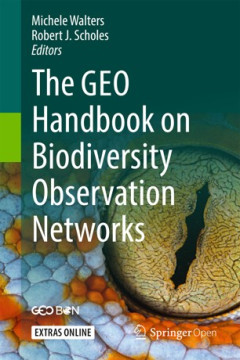
The GEO handbook on biodiversity observation networks
Biodiversity observation systems are almost everywhere inadequate to meet local, national and international (treaty) obligations. As a result of alarmingly rapid declines in biodiversity in the modern era, there is a strong, worldwide desire to upgrade our monitoring systems, but little clarity on what is actually needed and how it can be assembled from the elements which are already present. T…
- Edisi
- -
- ISBN/ISSN
- 9783319272887
- Deskripsi Fisik
- xii, 326p. : ill.
- Judul Seri
- -
- No. Panggil
- 577 GEO g
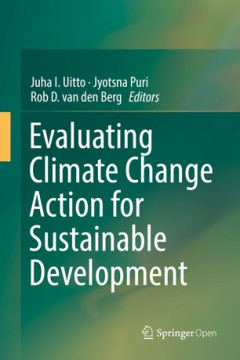
Evaluating climate change action for sustainable development
This authoritative book presents the ever progressing state of the art in evaluating climate change strategies and action. It builds upon a selection of relevant and practical papers and presentations given at the 2nd International Conference on Evaluating Climate Change and Development held in Washington DC in 2014 and includes perspectives from independent evaluations of the major internation…
- Edisi
- -
- ISBN/ISSN
- 9783319437026
- Deskripsi Fisik
- xxiv, 355p. : ill.
- Judul Seri
- -
- No. Panggil
- 363.73874 EVA e

Water resources systems planning and management :an introduction to methods, …
This revised, updated textbook presents a systems approach to the planning, management, and operation of water resources infrastructure in the environment. Previously published in 2005 by UNESCO and Deltares (Delft Hydraulics at the time), this new edition, written again with contributions from Jery R. Stedinger, Jozef P. M. Dijkman, and Monique T. Villars, is aimed equally at students and pro…
- Edisi
- -
- ISBN/ISSN
- 9783319442341
- Deskripsi Fisik
- xx, 624p. : ill.
- Judul Seri
- -
- No. Panggil
- 333.91 LOU w

High mountain conservation in a changing world
This book aims to provide case studies and a general view of the main processes involved in the ecosystem shifts occurring in the high mountains, and to analyse the implications for nature conservation. Although case studies from the Pyrenees are preponderant, conclusions are aimed at any mountain range surrounded by highly populated lowland areas. The chapters give emphasis to approaches from …
- Edisi
- -
- ISBN/ISSN
- 9783319559827
- Deskripsi Fisik
- xiv, 413p. : ill.
- Judul Seri
- -
- No. Panggil
- 577.53 HIG h
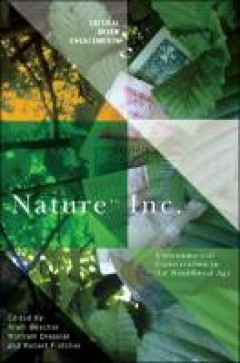
Nature Inc:environmental conservation in the neoliberal age
With global wildlife populations and biodiversity riches in peril, it is obvious that innovative methods of addressing our planet’s environmental problems are needed. But is “the market” the answer? Nature™ Inc. brings together cutting-edge research by respected scholars from around the world to analyze how “neoliberal conservation” is reshaping human–nature relations.
- Edisi
- -
- ISBN/ISSN
- 9780816539215
- Deskripsi Fisik
- 278 pages : illustrations ; 24 cm.
- Judul Seri
- -
- No. Panggil
- 363.7 NAT n

Peran matematika, sains, dan teknologi dalam mencapai tujuan pembangunan berk…
Tujuan Pembangunan Berkelanjutan (Sustainable Development Goals/SDGs) merupakan rangkaian agenda pembangunan berkelanjutan mulai tahun 2015 sampai 2030. SDGs terdiri atas 17 tujuan yang disepakati pada September 2015 oleh negara-negara anggota PBB, akan memandu pencapaian tujuan global yakni pembangunan berkelanjutan hingga tahun 2030. SDGs sesungguhnya disusun berdasarkan capaian Tujuan Pemban…
- Edisi
- -
- ISBN/ISSN
- 9786023923281
- Deskripsi Fisik
- xiv, 359p. : ill.
- Judul Seri
- -
- No. Panggil
- 307.1 PER p

Grading goal four :tensions, threats, and opportunities in the sustainable de…
For the third time in three decades world leaders reaffirmed their promise of "Education For All" when adopting Sustainable Development Goal 4 in 2015. It is the most far-reaching commitment to quality and equity in education so far, yet, there is no consensus on what the agenda means in practice. With a decade left until the 2030 deadline, Grading Goal Four calls upon the education communi…
- Edisi
- -
- ISBN/ISSN
- 9789004430365
- Deskripsi Fisik
- xxviii, 469 p. : ill.
- Judul Seri
- -
- No. Panggil
- 379 GRA g

Bats in the anthropocene :conservation of bats in a changing world
This book focuses on central themes related to the conservation of bats. It details their response to land-use change and management practices, intensified urbanization and roost disturbance and loss. Increasing interactions between humans and bats as a result of hunting, disease relationships, occupation of human dwellings, and conflict over fruit crops are explored in depth. Finally, contribu…
- Edisi
- -
- ISBN/ISSN
- 9783319252209
- Deskripsi Fisik
- ix, 606p. : ill.
- Judul Seri
- -
- No. Panggil
- 639.9794 BAT b
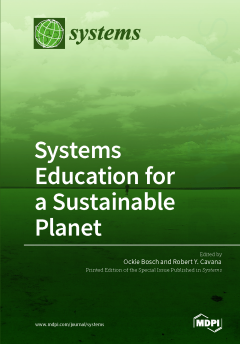
Systems Education for a Sustainable Planet
The issues facing humanity have become increasingly complex due to the fact they are embedded in a global web of ecological, economic, social, cultural and political processes that are dynamically interlinked. The capacity to conceptualise and redesign solutions, in systems and sustainability terms, will increasingly be what society and employers expect. This “expectation” is globally one o…
- Edisi
- -
- ISBN/ISSN
- 9783038427902
- Deskripsi Fisik
- vii, 239p.: ill.
- Judul Seri
- -
- No. Panggil
- 370 SYS s
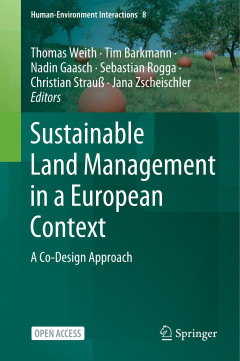
Sustainable land management in a European context :a co-design approach
This open access book present and discuss current issues and innovative solution approaches for land management in a European context. Manifold sustainability issues are closely interconnected with land use practices. Throughout the world, we face increasing conflict over the use of land as well as competition for land. Drawing on experience in sustainable land management gained from seven y…
- Edisi
- -
- ISBN/ISSN
- 9783030508418
- Deskripsi Fisik
- ix, 347p. : ill.
- Judul Seri
- -
- No. Panggil
- 333.73 SUS s

Ecosystem-based management, ecosystem services and aquatic biodiversity :theo…
Aquatic ecosystems are rich in biodiversity and home to a diverse array of species and habitats, providing a wide variety of benefits to human beings. Many of these valuable ecosystems are at risk of being irreversibly damaged by human activities and pressures, including pollution, contamination, invasive species, overfishing and climate change. Such pressures threaten the sustainability of the…
- Edisi
- -
- ISBN/ISSN
- 9783030458430
- Deskripsi Fisik
- viii, 580p. : ill.
- Judul Seri
- -
- No. Panggil
- 577.6 ECO e
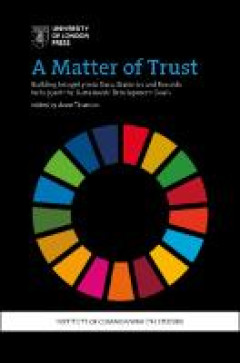
A Matter of trust:building integrity into data, statistics and records to sup…
The United Nations Sustainable Development Goals initiative has the potential to set the direction for a future world that works for everyone. Approved by 193 United Nations member countries in September 2016 to help guide global and national development policies in the period to 2030, the 17 goals build on the successes of the Millennium Development Goals, but also include new priority areas,…
- Edisi
- -
- ISBN/ISSN
- 9781912250349
- Deskripsi Fisik
- xviii, 270p.: ill.
- Judul Seri
- -
- No. Panggil
- 338.90091724 AMA a
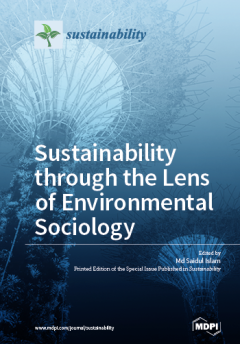
Sustainability through the lens of environmental sociology
Our planet is undergoing radical environmental and social changes. Sustainability has now been put into question by, for example, our consumption patterns, loss of biodiversity, depletion of resources, and exploitative power relations. With apparent ecological and social limits to globalization and development, current levels of consumption are unsustainable, inequitable, and inaccessible to th…
- Edisi
- -
- ISBN/ISSN
- 783038426615
- Deskripsi Fisik
- vii, 226 p.; 23 cm.
- Judul Seri
- -
- No. Panggil
- 599.95 ISL

Economics of land degradation and improvement:a global assessment for sustain…
- Edisi
- -
- ISBN/ISSN
- 9783319191683
- Deskripsi Fisik
- xviii, 686p.: ill.
- Judul Seri
- -
- No. Panggil
- 333.7 ECO e
- Edisi
- -
- ISBN/ISSN
- 9783319191683
- Deskripsi Fisik
- xviii, 686p.: ill.
- Judul Seri
- -
- No. Panggil
- 333.7 ECO e
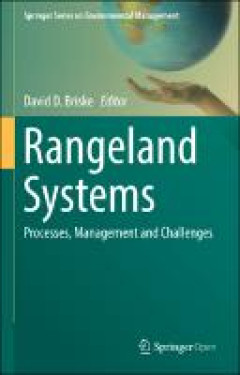
Rangeland systems:process, management and challenges
This book is open access under a CC BY-NC 2.5 license. This book provides an unprecedented synthesis of the current status of scientific and management knowledge regarding global rangelands and the major challenges that confront them. It has been organized around three major themes. The first summarizes the conceptual advances that have occurred in the rangeland profession. The second addresse…
- Edisi
- -
- ISBN/ISSN
- 9783319467092
- Deskripsi Fisik
- xv, 661p.: ill.
- Judul Seri
- -
- No. Panggil
- 577.4 RAN r

Renewables for energy access and sustainable development in east Africa
This short open access book investigates the role of renewable energy in East Africa to provide policy-relevant inputs for the achievement of a cost-effective electrification process in the region. For each country, the authors review the current situation in the domestic power sector, adopt a GIS-based approach to plot renewable energy resources potential, and review currently planned projects…
- Edisi
- -
- ISBN/ISSN
- 9783030117351
- Deskripsi Fisik
- 149 hlm
- Judul Seri
- -
- No. Panggil
- 330 HAF r
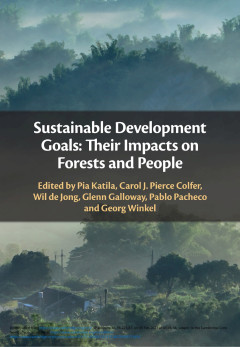
Sustainable development goals :their impacts on forests and people
Forests provide vital ecosystem services crucial to human well-being and sustainable development, and have an important role to play in achieving the seventeen Sustainable Development Goals (SDGs) of the United Nations 2030 Agenda. Little attention, however, has yet focused on how efforts to achieve the SDGs will impact forests and forest-related livelihoods, and how these impacts may, in turn,…
- Edisi
- -
- ISBN/ISSN
- 9781108765015
- Deskripsi Fisik
- xxxiv, 617p. : ill
- Judul Seri
- -
- No. Panggil
- 634.90286 SUS s

Artificial intelligence for a better future :an ecosystem perspective on the …
This open access book proposes a novel approach to Artificial Intelligence (AI) ethics. AI offers many advantages: better and faster medical diagnoses, improved business processes and efficiency, and the automation of boring work. But undesirable and ethically problematic consequences are possible too: biases and discrimination, breaches of privacy and security, and societal distortions such as…
- Edisi
- -
- ISBN/ISSN
- 9783030699789
- Deskripsi Fisik
- x, 124p. : ill.
- Judul Seri
- -
- No. Panggil
- 174.90063 STA a

What works in conservation 2020
" Is reduced tillage in arable fields beneficial for farmland biodiversity? Is prescribed burning in grasslands beneficial for bird conservation? Does livestock exclusion from degraded peatlands benefit peatland conservation? Is the provision of artificial shelters effective for subtidal benthic invertebrate conservation? Do wind turbine modifications reduce bat fatalities? Does adding topsoil …
- Edisi
- -
- ISBN/ISSN
- 9781783748358
- Deskripsi Fisik
- 731 p.
- Judul Seri
- -
- No. Panggil
- 333.7 WHA w
 Karya Umum
Karya Umum  Filsafat
Filsafat  Agama
Agama  Ilmu-ilmu Sosial
Ilmu-ilmu Sosial  Bahasa
Bahasa  Ilmu-ilmu Murni
Ilmu-ilmu Murni  Ilmu-ilmu Terapan
Ilmu-ilmu Terapan  Kesenian, Hiburan, dan Olahraga
Kesenian, Hiburan, dan Olahraga  Kesusastraan
Kesusastraan  Geografi dan Sejarah
Geografi dan Sejarah